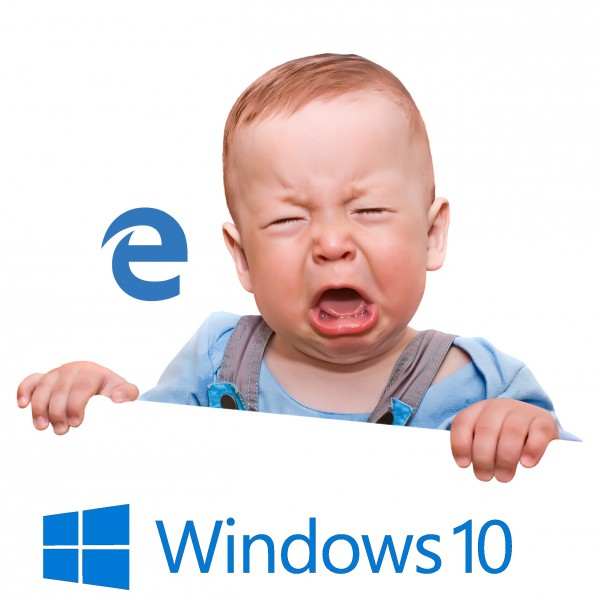Mozilla whines about Windows 10 -- writes misguided open letter to Microsoft CEO

When it comes to web browsers, I use many. Firefox is my go-to most of the time, but I also like Google Chrome and Microsoft's newly-released Edge. Mozilla's browser is extremely important to me, as I feel the world needs a truly open-source web browser. With that said, Firefox has been lagging behind lately and disappointing its core. The company only recently started developing a 64 bit Windows variant again -- it is insane that development stalled no matter what argument it gives. Worst of all, Mozilla started bundling the Pocket service in the browser. The service isn't bad, but it shouldn't be bundled.
Today, Mozilla chooses to whine about browser choice in Windows 10. Chris Beard, Mozilla CEO, pens an open letter to Satya Nadella (in full below), in which he argues that Windows 10 takes away a user's choice by "design". While I can understand his point, it is misguided and he comes off as petty and desperate. Do you agree?
Here is the letter in full.
Satya,
I am writing to you about a very disturbing aspect of Windows 10. Specifically, that the update experience appears to have been designed to throw away the choice your customers have made about the Internet experience they want, and replace it with the Internet experience Microsoft wants them to have.
When we first saw the Windows 10 upgrade experience that strips users of their choice by effectively overriding existing user preferences for the Web browser and other apps, we reached out to your team to discuss this issue. Unfortunately, it didn’t result in any meaningful progress, hence this letter.
We appreciate that it’s still technically possible to preserve people’s previous settings and defaults, but the design of the whole upgrade experience and the default settings APIs have been changed to make this less obvious and more difficult. It now takes more than twice the number of mouse clicks, scrolling through content and some technical sophistication for people to reassert the choices they had previously made in earlier versions of Windows. It’s confusing, hard to navigate and easy to get lost.
Mozilla exists to bring choice, control and opportunity to everyone. We build Firefox and our other products for this reason. We build Mozilla as a non-profit organization for this reason. And we work to make the Internet experience beyond our products represent these values as much as we can.
Sometimes we see great progress, where consumer products respect individuals and their choices. However, with the launch of Windows 10 we are deeply disappointed to see Microsoft take such a dramatic step backwards.
These changes aren’t unsettling to us because we’re the organization that makes Firefox. They are unsettling because there are millions of users who love Windows and who are having their choices ignored, and because of the increased complexity put into everyone’s way if and when they choose to make a choice different than what Microsoft prefers.
We strongly urge you to reconsider your business tactic here and again respect people’s right to choice and control of their online experience by making it easier, more obvious and intuitive for people to maintain the choices they have already made through the upgrade experience. It should be easier for people to assert new choices and preferences, not just for other Microsoft products, through the default settings APIs and user interfaces.
Please give your users the choice and control they deserve in Windows 10.
Sincerely,
Chris Beard
CEO, Mozilla
Yes, upgrading from Windows 7 or 8 will change your default browser to Microsoft's Edge. I can totally understand why this would upset a "competing" browser manufacturer. With that said, I think it is a good practice. Users of older versions of Windows that upgrade may be using outdated web browsers that are riddled with malware or toolbars -- a fresh start is a good idea.
Does this take away choice? Absolutely not. Windows 10 users can switch right back to Firefox if they choose to -- it is not hard. The real people this impacts are the ones that don't know how to change their default web browser, and quite frankly, if they don't know how to change back to Firefox, they also probably didn't know how to choose it. In other words, maybe they use Firefox only because a relative installed it years ago -- they never really made the choice.
Comically, Mozilla created a video to show people how to change their default browser. If it was a hard process, it would probably be a really long video, right? Well, it is only 34 seconds long. Seriously, it is that short. See for yourself.
https://youtu.be/mEUekKqLJ-E
Ultimately, people find a way to use quality products. If a Windows 10 user is clamoring for Firefox, they will figure it out. If they stick with Edge and don't bother, it simply means Firefox was not good enough to motivate them to try to change back.
Speaking of choice, I mentioned the forced integration of Pocket in Firefox. Guess what? You installed that even when people upgraded. By your same logic, you negatively impacted the user's choice to choose a Pocket competitor -- you can't have it both ways.
Let's not forget about Yahoo either. Mozilla did the exact same thing it is complaining about with Windows 10. When it signed a deal with Yahoo to make it the default search engine, it changed the user's chosen search engine without asking. When a user upgraded Firefox, if they had Bing or Google as default, it was changed to Yahoo. They then had to change it back. How is that different from changing default browser to Edge on Windows 10?
Rather than write open letters, how about making your browser better instead?
Photo Credit: Irina Rogova/Shutterstock